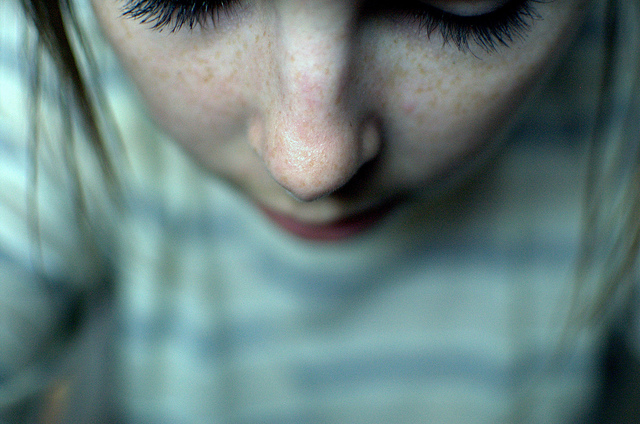My car died on me last weekend. Engine blown.
I’ve been avoiding this reality all week, arranging a patchwork of rides to help me meet my obligations, while absorbing the fact that I have to purchase a new car.
Making a major purchase is not a simple errand to run. In order to make a good decision, I have to consider my choices carefully. Trouble is, I won’t truly know if I’ve made the right choice until after I’ve paid several thousands of dollars to find out.
If you are anything like me, making major life decisions (and even some of the smaller ones) can feel like walking though a house of mirrors. Analyzing all the data can be disorienting as we attempt to navigate our way through the options in front of us. We ask friends, compare information and use up a lot of brainpower. Sometimes, even after making this investment in time and energy, we are left guessing.
But what if there was a better way?
What if instead of getting lost in a cost/benefit analysis, we could tap into our trusty inner compass? Some call it listening to your gut, others the wisdom of the third eye. I call it trusting my intuition.
Intuition: noun in·tu·i·tion \ˌin-tü-ˈi-shən, -tyü-\ – The power or faculty of attaining to direct knowledge or cognition without evident rational thought and inference: a feeling that guides a person to act a certain way without fully understanding why. ~ Merriam-Webster Dictionary
I’ve always been fascinated by intuition, particularly the idea of having a sixth sense. Unlike other spiritual concepts, which seem experientially out of reach, I have had personal experience with intuition. I have felt deep satisfaction when trusting my intuition turned out well and have suffered the consequences when I’m not quite tuned in.
My hunch is that most of us have had a similar experience.
Which leads me to wonder—why aren’t we all working like mad scientists to learn how to develop our “hunches” into a more finely tuned instrument?
If we in fact do have a sixth sense, why do we invest so much faith and energy in logical thought?
Culture is certainly a major influence. Here in the West, we are smitten with rational thought and reason. The scientific method is considered the most dependable tool for determining outcome among scholars and intelligentsia; the more methodical our decision-making process, the more respected it is.
Our primary education also strongly encourages the use of our rational minds. When was the last time you’ve heard an educator tell a child to follow their gut?
Don’t get me wrong, I’m not a climate change denier—I appreciate the scientific method and the veracity of the discipline. In fact, one of the primary difficulties I have always had with so-called “spiritual” literature is that often it is based on entirely subjective experiences, and therefore can easily be misrepresented— a game of smoke and mirrors. It takes more than an intuition to develop life-saving vaccines and construct buildings that won’t fall on our heads.
And yet, there is this tangible and personal experience of intuition, which in my case has proven itself to be an extremely accurate divining instrument.
It’s like we have this sophisticated GPS technology at our disposal—an internal, proprietary system of knowing—which can tell us with incredible accuracy how to navigate our day-to-day lives. But instead of relying on it, we fumble with oversized maps that cut off at the edges and leave us guessing which way to turn.
“The intuitive mind is a sacred gift and the rational mind is a faithful servant.” ~ Einstein
Science recognizes that this type of thinking is hardwired into the human species. Our reptilian brains allow us to react so quickly and effortlessly to things that threaten us, it barely qualifies as thinking. It’s more on the level of instinct. But where does it live in us?
Several years ago I saw the film, “I Am,” about a filmmaker’s investigation into his spiritual self. The film featured founders of an organization called Heart Math, whose theory places the human heart at the center of our intuitive abilities.
The film was panned by critics and scientists alike, but I was intrigued by the question at the heart of Heart Math’s mission: does the heart have an intuitive intelligence that surpasses rational intelligence in speed and accuracy?
“A hunch is creativity trying to tell you something.” ~ Frank Capra
Have you ever had the experience of perceiving a shift in energy when someone who is really anxious or angry walks in the room? Where do we feel that? What in our bodies creates that experience?
It turns out that trusting your gut is not simply a metaphorical connection. Our digestive system is controlled by a part of our nervous system known as the autonomic nervous system. Considered by scientists to be our body’s second brain, this system of neurons, hormones and chemical neurotransmitters allows the brain to “talk” directly to the gut—and apparently, the gut talks back.
In one mind blowing example of its function, the microbes that live in the sticky lining of our gut play a huge part in the release of the neurotransmitter serotonin, which regulates feelings of happiness. In fact, 95 percent of the body’s serotonin is found in the bowels.
It’s much more complicated than that, but what matters to me is this: If our gut can influence our happiness and is connected to our sense of well-being, then having a gut feeling that something is right or wrong—hey, I’m not a scientist, but it seems quite plausible!
Heart, brain, bowels—is intuition simply a by-product of our physiology?
“We have two eyes to see two sides of things, but there must be a third eye which will see everything at the same time and yet not see anything. That is to understand Zen.” ~ D.T. Suzuki
From its position deep in the center of the brain, the pineal gland is often associated with what is called the third eye or the inner eye.
Like our eyes, the pineal gland is light receptive; its primary function is the regulation of our circadian rhythm. When the pineal gland is activated, we literally wake up. No wonder it has long been associated with spiritual awakenings, which often center on the idea of light and wakefulness.
French philosopher and mathematician René Descartes considered the pineal gland the “principal seat of the soul and the place in which all our thoughts are formed,” while many Eastern religions view the third eye as being a channel to an inner and hidden power.
Not coincidentally, most statues depicting Buddha feature a nodule between Buddha’s eyes, which represents this invisible inner eye, symbolizing a “perception of reality beyond ordinary vision.”
“Reality is nothing but a collective hunch.” ~ Lily Tomlin
I first read about the term thin slicing in the book Blink, by Malcolm Gladwell. The book made a lasting impression on me because it opened my mind to a completely different way of making decisions.
Thin slicing is described as our ability “to use limited information from a very narrow period of experience to come to a conclusion.”
Of the stories in the book, the one that sticks out in my mind is that of the Getty kouros, an ancient and rare Greek statue that had been procured by the Getty Museum. With only about 200 kouroi in existence, the statue underwent extreme scrutiny by a number of experts before the museum agreed to plunk down nine million dollars for it.
However, when the statue first went on display, other experts came forward with their doubts, calling the statue a fake. One by one, these experts voiced their instinctive feelings that something about the statue was just not right. The authenticity of the statue is still in question to this day.
The main thrust of Gladwell’s book and the concept of thin slicing is that we can make decisions in the smallest windows of time and experience. Something akin to the idea of first impressions—that instantaneous moment of perception in which we know something about a person before we can verify it.
Psychological research shows that we can accurately draw conclusions and predict outcomes within the first five seconds of observing an interaction between two people. These observations take place on a sub-conscious level.
What else is happening in the subconscious? It’s the place where creativity resides.
“Intuition is a homing instinct able to forage in areas where rationality would get lost.” ~ Francis Cholle
In his work on “intuitive intelligence,” consultant Francis Cholle works with organizations to help them tap into their teams’ innate creativity by moving beyond the logical mind and toward the subconscious realm of creativity and genius.
“Intuition…dives down into the depths of the unconscious where reason and instinct collide…and it latches onto hidden connections and contradictions. It brings this information—via an unusual sign, a rare sensation, an unexpected feeling, or a seemingly irrelevant fact—to the surface of consciousness to feed the rational mind and enable logic to work with paradox.” ~ Francis Cholle
In Cholle, I found a convergence of science and spiritual understanding. He suggests that in order to solve the complex problems facing humanity, we have to move beyond traditional models of thinking. Cholle describes this as the anchoring of instinct to reason—through which “a non-rational logic” emerges.
Why does any of this matter? If it is true that the odds are in our favor—if we are as likely to make a good decision within one moment of perception as we are with hours and hours of rational, cost/benefit analysis—then we can all relax a little! We can begin to trust ourselves.
I’m not suggesting we all just follow our first impulses. Nor am I suggesting that following our intuition will solve all of the problems facing us. There are many factors, including economic realities, which impact our ability to relax and follow our instinct. Telling a mother whose children are starving due to circumstances out of her control to “follow her gut” would not only be callous, it would show the greatest of ignorance.
However, for those of us with “first world problems” such as buying a new car, perhaps we all could relax a little and trust our inner wisdom a bit more. This would inevitably lead us to being less stressed throughout the process, which in the end would result in better decision-making.
Less stress leads to less anxiety and more inner harmony.
More harmonious people will equate to a more harmonious world.
That’s just my gut.
~
Relephant Read:
Practicing Intuition is Crucial For Our Health: Here’s Why.
The Danger of Ignoring Intuition in Relationships.
Author: Roseann Pascale
Editor: Yoli Ramazzina
Photo: Flickr/bailey foster







Read 19 comments and reply